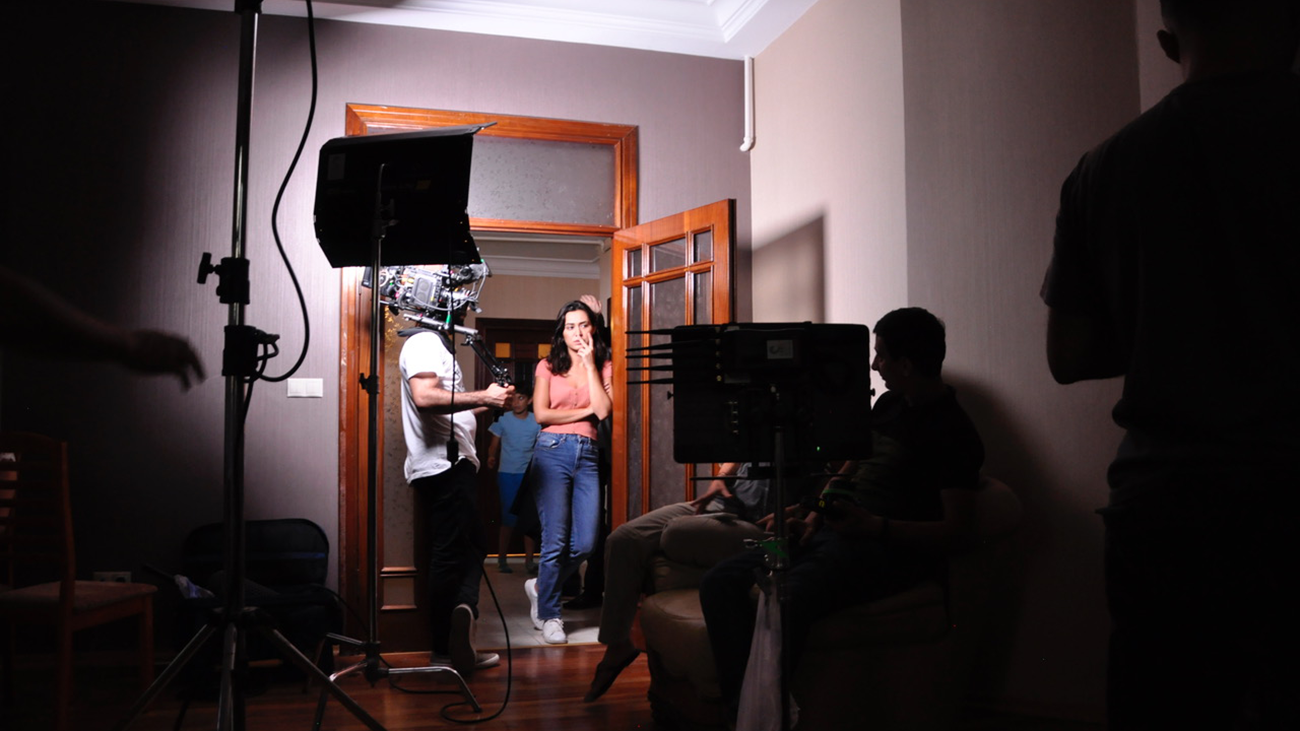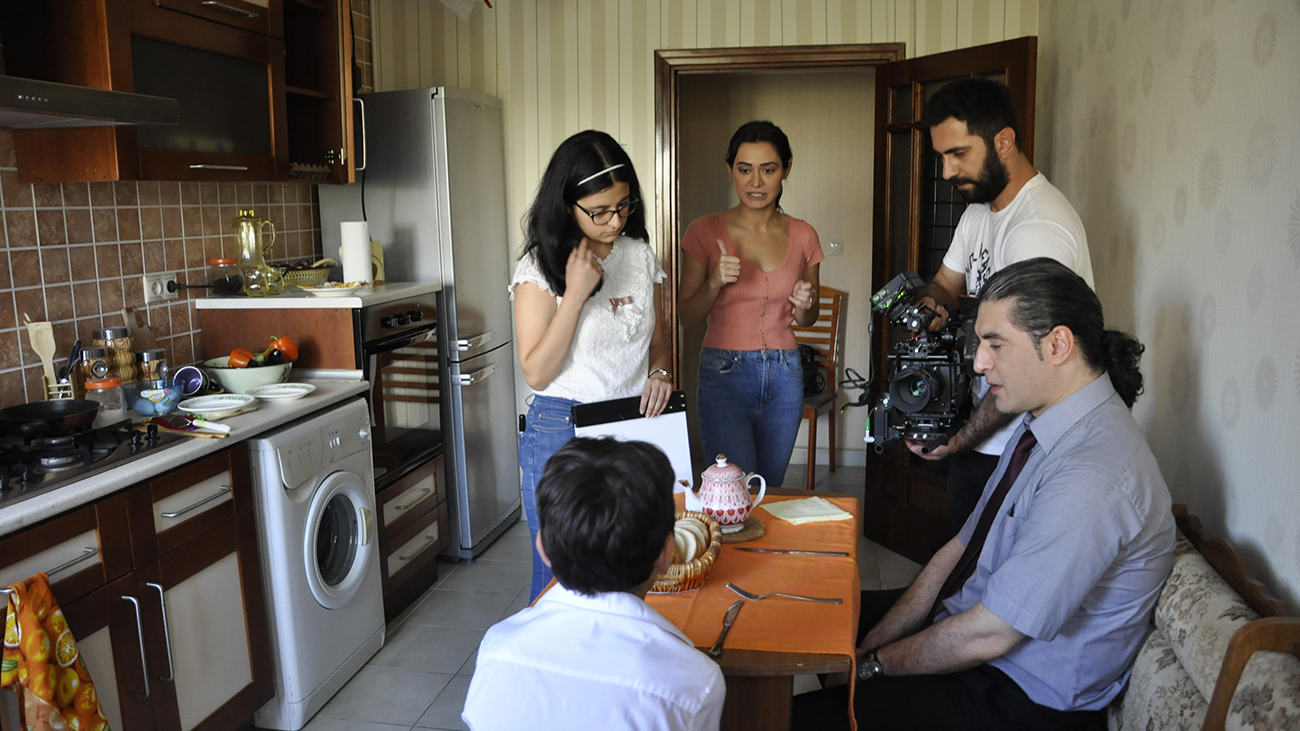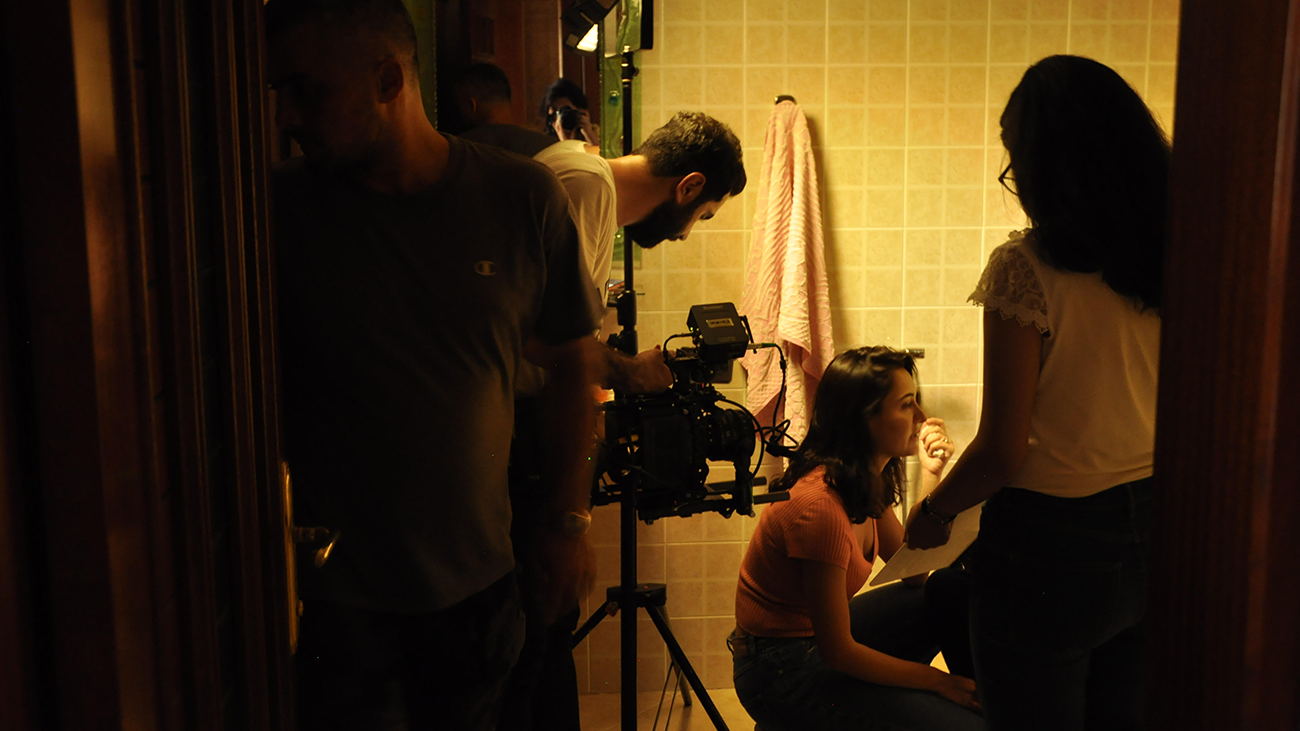Azerbaijan is a country many people have never heard of. I don’t blame them; for most of its existence, it belonged to an empire that swallowed its identity. From 1920 to 1991, Azerbaijan was under Soviet control but is now independent. It is neither entirely part of Europe, nor entirely part of Asia. The native language is Azerbaijani, but many residents are also fluent in Russian. Islam is Azerbaijan’s dominant religion but its institutions remain secular. And in regards to its government, the same ruling party has held power since 1993.
My family and I left Azerbaijan in 1996 to immigrate to Canada. Growing up in Canada, I had incredible access to watch almost any film I wanted, from any country. But I ignored Azerbaijani films. A few years ago, my father told me that when he was young, two Azerbaijani filmmakers unsuccessfully tried to cast him as the male lead in their movies. That story piqued my interest and I went looking for information on Azerbaijani films, only to be amazed at how many films existed and had even been programmed at festivals all over the world.
When a country is unrecognized by the wider world, then its film history is especially hidden from view. But like any country, Azerbaijan is filled with storytellers, creators and performers, and they yearn to tell the story of their land and their people in their own language. They want to paint the beautiful landscapes of the country onto celluloid as a method of preservation and also a way of shining a light on the oil-rich nation that borders the Caspian Sea. They want to share the stories of their brother and sisters to show that these tales are just as valuable as any other.
In watching Azerbaijani films, you will find stories that are universal. The search for true love, the desire to live your dreams, and the hardships faced by those who don’t enjoy wealth and status. Of course, there are also elements that could only be found in Azerbaijani films and understood by its people; cultural quirks, historical references and untranslatable jokes.
And, like in every country, Azerbaijan’s film industry is dominated by men. They are the ones writing the scripts and standing behind the camera. But, on occasion, a woman breaks through to the other side.
Azerbaijani filmmaker Tahmina Rafaella was only 19-years-old when her script, Icari Sahar (Inner City), was made into a film where she also starred as the lead character. She has gone on to pursue an acting career in Los Angeles, while still writing. Her short film Qadın (A Woman) is her directorial debut, which she also wrote, produced, and starred in.
Set in the capital city of Azerbaijan, Baku, Qadın (A Woman) follows the day in the life of a woman who takes on many roles in her life: wife, daughter, mother, and caretaker—while trying to hold onto her sense of self. The film is part of the 2020 ShortFest line-up at the Palm Springs International Film Festival.
We were fortunate to have the opportunity to speak with Tahmina Rafaella about her work, as well as the Azerbaijani film industry. The following interview has been edited for clarity.

What inspired you to write Qadın (A Woman) and how long did it take to complete the script?
Surprisingly, it didn’t take me long. I came up with the idea in a day and it stayed in the back of my mind for about two months, and when I finally decided I wanted to take a leap into directing it felt very natural that I would write the script to that very idea.
I had other short scripts I’ve written that haven’t been produced, but it felt natural and timely to write and direct this one. So I wrote the script in a day and made changes here and there up until the day we started shooting.
Qadın (A Woman) shows a woman whose life fulfills common feminine expectations but it’s hinted that she wants more. Do you think Azerbaijani culture struggles to allow women to live in a way that defies traditional expectations and how has that impacted you personally?
I think it’s gotten better, but we still have a long way to go. I myself have been raised in a more liberal, supportive family, and I’ve attended international schools so I can’t compare myself to the cases of many women who feel caged by their own families. But it’s still impacted me growing up and I wasn’t immune to it.
For a long time I lied to myself and others about what I wanted to be when I grew up because I was told that actresses are ‘whores’, or that it’s not a profession you can have if you also want to have a family, but I don’t remember the same being told about being an actor. There’s also a lot of uneducated male directors in Azerbaijan that publicly say that women shouldn’t be given a place in the film industry.
I don’t think those men should be given a public platform, period. It’s an embarrassment for our nation and insults so many [people’s] intelligence, not just women’s, and further allows men to openly spread their ignorance on an already lacking, old-fashioned mentality. This isn’t a matter of them being allowed to express their opinion, this is a matter of them openly discriminating against someone based on their gender, and it shouldn’t be allowed on TV or any other public platform. There are young women out there, perhaps with dreams of becoming filmmakers one day, listening to that nonsense on TV.
Was there any particular reason the film was dedicated to your mother?
My mother is giving and nurturing in the same way that my character is in the film. She’s also a major inspiration for the film and myself. She’s someone who worked hard, raised her children and was also a great daughter and wife. The only difference is that my father is not a jerk and gives credit when credit is due.
But I think even with the most loving man, it’s difficult to understand just how much mothers and women are capable of giving, with their empathy and compassion, and how often it goes unnoticed. I think it goes back to the divine feminine, the ‘gaia’.

What challenges arose from both acting and directing at the same time?
I would not recommend doing it to anyone who’s directing for the first time, or if you do, make sure you have an [assistant director] you trust and can rely on. When you have a small crew, a low budget and only a limited amount of days to shoot, the way I did, it can get really stressful to act and direct at the same time. To be honest, I’m surprised it worked. I also had a clear vision of what I wanted from the start, so that helped in minimizing unnecessary shots and saving time.
How did you approach casting the other characters in Qadın (A Woman)?
I worked with Zaur Shafiyev on something else a couple of years ago and I liked him both as a person and an actor. So it was easy. The [son] is someone I am related to, and he expressed a desire in acting, so I took a big risk on that one but thankfully it worked out. Vidadi Hasanov, a lovely person and actor, was someone that a friend of mine recommended.
Everyone else, [such as] the voice on the phone and the two men that appear at the end, those were my non-actor friends who were doing me a favor. I didn’t have time or money in my budget to put aside for proper casting, but I don’t have any complaints about the actors in my film. I think they did wonderfully.
Your writing is very focused on women and their stories. What is the driving force behind your desire to shine a light on women, particularly Azerbaijani women?
Firstly, I cannot name any modern Azerbaijani films that shine a light on the female experience. There’s a difference between putting females in your films and shining a light on the female experience. Also, I can only name one modern Azerbaijani film that has a female in a leading role. We’re seeing more of those films internationally, although not enough, but we have yet to see them in Azerbaijan.
That’s also where my passion lies and what I’m interested in bringing awareness to. I’m tired of seeing Azerbaijani movies that portray the same issues we’ve seen countless of times. This would change if more female voices were given a chance [to make films].

Many creators leave their native countries in search of better opportunities in the film industry and never return. What has made you return to Azerbaijan?
When I left Azerbaijan, I left to study and pursue a lifestyle that aligned more with my beliefs and values. I always say that Azerbaijani filmmakers and actors shouldn’t be so quick to rush into trying to make a career in filmmaking happen abroad right away. I think it’s valuable to get the right education and connections abroad, but there is a bigger platform and unique subject matters to explore in Azerbaijan. I’m also a firm believer in writing about what you know best.
I always knew that if I ever decided to try writing and directing, I would want to make movies in Azerbaijan because that’s what [I want] to bring awareness to. I want to be someone who contributes to the society I was raised in, and my way of doing that is by continuing to make movies in Azerbaijan and hopefully allowing that to open space for more filmmakers, especially women, out there.
For those interested in Azerbaijani film, what would you recommend that they watch?
Elchin Musaoglu’s Nabat. It reminds me of the works of Iranian auteurs and it’s the only contemporary [Azerbaijani] film with a leading female role. It premiered at the Venice Film Festival.
The film industry in Azerbaijan is still very small. As you’ve said in previous interviews, many creative people may not even realize that making films is a career option. What do you feel is needed for the film industry to grow and develop further within the country?
First of all, we need to stop with the sense of nationalism that is still so persistent in our country. I don’t mean to abandon [our] roots and forget our beautiful culture, history and traditions. What I mean to say is, we need to stop pretending like everything is great and waving our flag in every film. I couldn’t even make a character a Russian speaker [in my films] because that would be considered betrayal. I understand that we have our own beautiful language, but art is also supposed to be a reflection of reality and it’s okay to merge the two languages in movies if it fits the narrative.
Some of us were born during the Soviet Union [and] our parents raised us speaking the language they spoke at school and growing up. Do they expect the Russian language to be wiped out from our DNA right away? There are still many Russian speakers [in Azerbaijan], and that doesn’t make them any less Azeri than the people who only speak Azeri. Same goes for many Russian speakers in Azerbaijan—they often see themselves as superior to Azeri speakers in their intelligence. Again, it’s a matter of both sides not being tolerant of each other sometimes which is unfortunate. Let’s focus on what people do for our country and communities instead of focusing on the language they speak at home.
People need to be more tolerant of each other in every aspect, and both Azeri and Russian speakers have a right to co-exist and create without being judged by the other party. Elchin Musaoglu, an Azeri speaker, is a good example of someone who beautifully and with great pride brings forth our culture and tradition in film but yet doesn’t impose the ignorance and hate that comes with a sense of toxic nationalism.
We also need younger voices, because right now most feature films are still being made by old-fashioned males. That is changing and we have more emerging young filmmakers, which I think is a great step forward.
Who are your favorite filmmakers working today?
Terrence Malick, Andrea Arnold, Asghar Farhadi, the Dardenne Brothers, Susanne Bier, and Ken Loach to name a few of the ones working today.
You are currently working on a script for a feature-length film you intend to direct. What can you tell us about that project?
It’s a film about an Azerbaijani woman, and the subject matter is based on real events and has to do with the toxic societal environment and the obvious double standards imposed on women [in Azerbaijan] to this day. It’s also a story of motherhood, love, family and choices that we are faced with every day.
